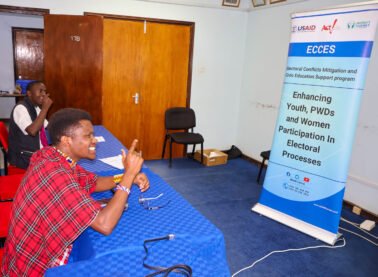

What Policy interventions, Laws & Acts of Parliament, and recommendations can the Gen-Z use in holding their leaders accountable based on their mandate and promises?
This was the elephant in the room during a dialogue forum facilitated by MIDRIFT HURINET under the Kenya Electoral Conflicts Mitigation & Civic Education Support Program courtesy of support from USAID KENYA through Act Change Transform on strategies for holding leaders to account.
The forum brought together student leaders from Egerton and Mount Kenya
Universities and also aimed at capacity-strengthening those on the timelines set out in law in the follow-up process.
In the wake of the pro-Governance demonstrations in the Country, in which a large number of participants acknowledged to have participated, Article 37 was the popular Article they had grasped. Article 37 of the Constitution of Kenya (2010) guarantees the right to peaceful assembly, demonstration, picketing, and petition. It states;
Article
37 – Assembly, demonstration, picketing, and petition:
"Every person has the right, peaceably and unarmed, to assemble, to demonstrate, to picket, and to present petitions to public authorities."
Key Elements of Article 37:
1. Right to Assemble: Individuals have the right to come together in a gathering or assembly.
2. Right to Demonstrate: Individuals have the right to participate in demonstrations to express their views.
3. Right to Picket: Individuals have the right to engage in picketing, which typically involves standing or marching at a location to express a protest or demand.
4. Right to Present Petitions: Individuals have the right to present petitions to public authorities, allowing them to formally submit their concerns, demands, or requests.
The conditions set are for the demonstrators to be Peaceful and Unarmed:
These rights must be exercised peaceably and without carrying arms or weapons.
The significance of Article 37 is:
1. Democratic Participation: Article 37 ensures citizens can actively participate in democratic processes by expressing their views and concerns.
2. Accountability: It provides a means for citizens to hold public authorities accountable and seek redress for grievances.
3. Human Rights: It aligns with international human rights standards, recognizing the importance of freedom of assembly and expression.
Article 37 is a fundamental part of the Bill of Rights in Kenya's Constitution, reflecting the commitment to upholding democratic freedoms and Human Rights.
The legal framework in Kenya provides robust protections for the rights of demonstrators to assemble, demonstrate, picket, and petition. While there are requirements to notify authorities and maintain public order, these provisions are designed to ensure the safety and security of all participants.
The oversight mechanisms provided by bodies like IPOA and KNCHR further strengthen the protection of demonstrators' rights and ensure accountability for violations.
The emerging leaders were also informed of other laws that protect them during the demonstrations and picketing which included;
Constitution of Kenya (2010)
Article 37: Guarantees the right to peaceably and unarmed assemble, demonstrate, picket, and present petitions to public authorities.
Article 33: Protects the freedom of expression, allowing individuals to express their views and opinions during demonstrations and picketing.
Article 38: Protects political rights, including the right to campaign for a political cause, participate in political activities, and demonstrate support or opposition to political issues.
Public Order Act (Cap 56)
Section 5: Requires organizers of public meetings or processions to notify the police in advance. This is intended to allow the police to provide security and ensure public order, not to restrict the right to demonstrate.
Section 8: Empower the police to impose conditions on the holding of public meetings and processions to prevent disorder. However, any conditions imposed must be reasonable and necessary to maintain public order.
National Police Service Act (2011)
Section 24: Outlines the responsibilities of the police, including protecting life and property, preventing and detecting crime, and maintaining law and order.
This includes the duty to protect demonstrators and ensure their safety during lawful assemblies.
Section 49: Stipulates that police officers must respect human rights and fundamental freedoms when carrying out their duties, including managing public gatherings.
Penal Code (Cap 63)
Sections 78-84: These sections address unlawful assemblies, riots, and breaches of the peace. They outline the consequences of engaging in violent or disorderly conduct during demonstrations. Peaceful demonstrators are protected as long as they do not engage in criminal activities.
Armed with this information, the Students were eager to know of the legal means they could use to hold their leaders to account apart from the demonstrations.
They were informed on how they could utilize Memoranda, Access to Information, and Petitions.
Petitions, Memorandum, and Access to information are constitutionally protected and are an avenue for fostering accountability and good Governance.
These provisions are in the Bill of Rights;
Petitions are protected under Article 37 which states, “Every person has the right, peaceably and unarmed, to assemble, to demonstrate, to picket, and to present petitions to public authorities."
Access to information is safeguarded under Article 35 which states,
“1)"Every citizen has the right of access to—
(a)information held by the State; and
(b)information held by another person and required for the exercise or protection of any right or fundamental freedom.
(2) The State shall publish and publicize any important information affecting the nation.
(3) Every person has the right to the correction or deletion of untrue or misleading information that affects the
person."
Memorandums are safeguarded under Article 118 which says,
“1)"Parliament shall—
(a)openly conduct its business, and its sittings and those of its committees shall be open to the public; and
(b)facilitate public participation and involvement in the legislative and other business of Parliament and its committees.
(2) Parliament shall not exclude the public, or any media, from any sitting, unless in exceptional circumstances the relevant Speaker has determined that there are justifiable reasons for the exclusion.”
The following ACTS of Parliament further supplement what is in the Kenyan Constitution.
Petitions:
Petition to Parliament (Procedure) Act, 2012: This Act provides for the procedure for presenting petitions to Parliament. It outlines the format and requirements for submitting petitions and ensuring that citizens can present their grievances and requests to their elected representatives.z
Access to Information:
Access to Information Act, 2016: This Act gives effect to Article 35 of the constitution by providing for the right to access information held by public entities and private bodies.
The Act outlines the procedures for requesting information and mandates public entities to disclose information about public
interest proactively.
Memoranda:
Public Participation Bill: This Bill, when enacted, aims to provide a framework for public participation in governance processes, including the submission of memoranda.
It seeks to ensure that the public can engage in legislative processes and have their input considered in decision-making.
The student leaders were informed on modalities of coming up with petitions, Memoranda, and Access to information while leveraging on existing intergenerational dialogue forums with their community members.
They committed to advocating for the upscaling of Youth representation in Community structures such as community security committees & enhancing the representation in their Universities Councils, Youth representation in Governance & Political structures within their areas of administrative & Political representation, writing petitions, access to information & Memoranda on Government projects & programs in all levels of Government particularly on the new model of education funding and share the knowledge, information & insights with their peers in their respective Universities.
Technology and digital tools such as TikTok, Facebook, Instagram and X (formerly Twitter)are important facets Youths in Kenya use to hold their leaders accountable.
Young People have used their blogging and Vlogging skills to sensitize and track petitions and Government spending at all levels of Government.
The student leaders were also informed about an important aspect of the Petition tracker when they forward their petitions to either the National Assembly or the County Assembly.
A petition tracker is a tool or service designed to monitor the progress and impact of petitions. It helps users keep track of various aspects of a petition.
The tracker captures the petition itself, the status of the petition, and the response regarding the petition.
While at it, the role of elected leaders in oversight, representation, and legislation was reemphasized.
The majority of the University leaders had shown interest in seeking elective positions in subsequent elections.
They were encouraged to form or join Youth Engagement Councils and use them as lobby groups in addressing their grievances as MIDRIFT HURINET continues creating more communities of practice through Civic Education, and Mentorship by highlighting impact stories on Youth Activism and Media Literacy.
By Jacob Karani


MIDRIFT HURINET is a Non-Profit organization registered as a company and operating in Kenya since 2008, whose key focus is addressing Peace & Security, Governance, Institutional Development and Support.
NAKURU OFFICE
Ronald Ngala Road,
Christ The King Training Institute
Building, First Floor.
P.O.Box 16326-20100, NAKURU,
KENYA
E: info@midrifthurinet.org
Website: www.midrifthurinet.org
Phone : (+254) 700 423 262
NAIROBI OFFICE
Ralph Bunche Rd, Milimani Ln, Tetu Appartments, 2nd Floor Door 4.
P.O BOX 11128-00100 NAIROBI,
KENYA
SOCIAL
© COPYRIGHT 2024 MIDRIFT HURINET





